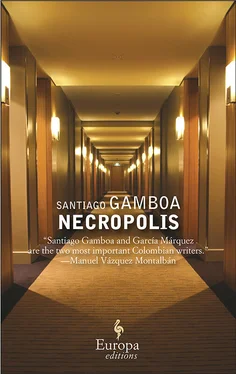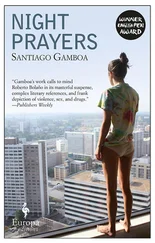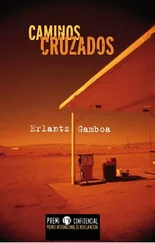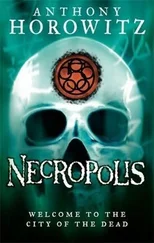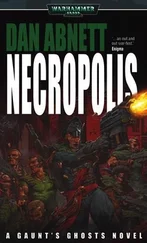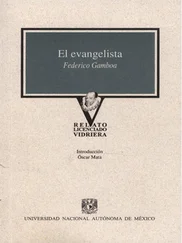Sometimes I ask myself, when exactly did José start to plan his betrayal? why did he betray him? what on earth did Walter ever do to him apart from drag him out of the gutter, give him his dignity, show him a path to follow, and provide him with a home? Great men are always betrayed by their disciples or their favorite sons, who are closer to the light, the light they want to have all to themselves, and if they can’t have it, they don’t want anyone to have it. They want it so much, they prefer to destroy it. This is what I believe happened: José wanted the whole logistical apparatus of the Ministry to disappear, he wanted Walter to again be a fragile young man treading the sidewalks of the world, with José by his side, protecting him, keeping the beasts off him, giving him warmth. I believe José betrayed Walter because he loved him.
José talked about a fight that never took place in Moundsville, but what he did describe very well was that when he came to, they both wept. That image reduced me to tears: two men who had lost their way, suddenly realizing that something unites them, and that they will have to be together for the rest of their lives. That’s very beautiful, and it only happens to the disinherited. It happened to me, too. But then comes the rest of your life. What starts well gradually acquires a bitter taste until somebody goes crazy. And that’s because inside love, hate resides, a nasty animal waiting to hatch and take flight. That happened to José, and his wings never stopped growing. He wanted to take his revenge, but on what? He probably didn’t even know that himself.
Walter’s fall had to mean that the crown would pass to José. Walter disappeared, and that was his victory. But you must be thinking, what kind of victory is it to spend the rest of your life wracked with guilt, constantly harking back to the paradise you destroyed, the paradise you lost through your own selfishness and hate? That’s how it was, José wanted to be Walter, to possess him completely, to be the only person who received his love, and in order to do that he had to destroy him. It wasn’t for the luxury or the money, in that at least José was a true follower of Christ.
The one time I went into his cabin I realized how pure his hate was, and I said to myself, it is as devoid of greed and reasons as the blindest love, it is a clean uncontaminated hate. His hut was a bare space filled with books, an easy chair, a stool, a writing table, a mattress, and nothing more, no decoration, no reminder of the beautiful things there were in the world, in the lives of the common people. Nothing at all. Only austerity and discipline. It was obvious that the person who lived there was concerned only with his own soul. A strange silence seemed to hover in the atmosphere. There were no mirrors, only a single light over the chair. José’s hatred for Walter is one of the purest, most uncontaminated things I’ve ever known. A motiveless hate that asks only to be exercised.
As the afternoon wore on, it was becoming increasingly more humid, so I asked for a lemonade. The noises of the street seemed to be carried ever more clearly on the air: scraps of conversation, horns, cars accelerating. Jessica did not seem to hear them. She lit a cigarette and continued her story.
José spent his days in his cabin in the garden, far from the everyday life of the house, and that protected him. It served his purposes. All that resentment would have been visible in the eyes, there’s no way you can hide something like that every minute of the day, but with him being at a distance we just didn’t see it. What happened in Colombia was another example. I don’t know if you remember. José mentioned a party at a hotel, when Walter was depressed and I gave them drugs. Well, I’ll tell you what really happened. It’s true that Walter was sad, but not because he’d turned into a prima donna, as José’s story suggested, but because he was genuinely hurt that his word was not being heard after so much effort and so much traveling, especially as, for him as for José, Latin America was the territory of his dreams. You can choose to believe me or not, but that night the drugs came out of José’s bag. Half a kilo of cocaine and three bundles of twenty-four crack cigarettes. The three of us drank and snorted. Remember, we were children of the streets, all that was part of our environment. It was the first time I’d seen Walter taking drugs, and I confess that the reason I did it was fear, fear of being left behind, abandoned, like someone running through a maze afraid to let go of the hand leading her. That night something took possession of us; I remember hearing some kind of construction work going on in the distance and feeling that I was being buried alive. That fear drove me to look for strength, just as it did them. It wasn’t a pleasant night, the fear didn’t go away, it was there in our words, in our glances, and, of course, in the silence. I stayed out on the balcony, in case they started fighting. We were on the twelfth floor and it wasn’t worth taking risks, anything was possible. They talked about the future of the Ministry. José said we should continue working in Latin America, expand, but Walter said no, better to carry on in our own territory, where we know what we’re doing, this attempt has been a lesson to us, we should listen to God, hear what He’s telling us through these failures. The same thing always happens when two men try to change the world: one prefers to stay within his own territory and the other wants to go out and knock down barriers; one of the two ends up badly, usually the one who goes outside, but in this case it was different because there was another element: resentment.
That night José felt frustrated and slit his wrists in his room, but they found him in time. Exactly as he told it, although I don’t know if his motives where those he said. José was ready for anything. It’s hard to see the danger when it’s disguised as love and lives with you, when you see it every day and have stopped recognizing it and it doesn’t surprise you. I never stopped seeing it, which is why one day I made up my mind to talk to Walter. I had to warn him and tried to find the words, but couldn’t. I wasn’t good at putting the blame on others, or speaking out of turn. My love for Walter was too strong. But in order to protect him, I was ready even to do that, so I talked to him on the plane during a trip to Charleston. I told him what I thought of José, how scared of him I was, how sure I was that he would end up hurting both him — Walter — and the Ministry; he let me speak without interruption, looking straight at me, his eyes like two letters blazing in the darkness, a and f, for example, standing for always and forgive, two words he used a lot; when I stopped speaking he hugged me in a fatherly way, and said, poor Jessica, what you must have suffered, feeling all that, being scared without my knowing it, without my being able to help you; he hugged me tighter and said, listen, listen carefully. What, Father? and he said, my heart, Jessica, do you hear it beating? Yes, Father, I hear it. Then remember, those little heartbeats are the life that you give me, through your love and faith. You are the one who protects my heart. While there is love in you, it will continue beating in my breast, whatever happens. He closed his eyes and we both cried. I felt relief for a few days, but then the fear returned.
When José started writing the book, there was a lull. We’d stopped going to the Flacuchenta together, so I was able to devote myself body and soul to Walter, to him and to prayer, because the call that God made to me was great and my answer a genuine one, although you may find that hard to believe. My devotion and my vocation are as strong as ever, do not doubt that for a second. The same could have been said of Walter, who was a pure soul; that was the only thing his burnished, muscular body had ever expressed, yes, it may have been a beautiful wrapping, but his strength came from inside, from his will and his love and his word. I don’t want you to think that I’m some kind of fanatic. In talking of him I talk of God. Many people accused the Ministry of being a cult, like the Moonies or the Davidians; they accused it of stealing from believers, of selling false dreams to the working classes. Poor accusers, what ignorance and what wickedness, what energy expended on wickedness. Why don’t they accuse the Church of Rome, with its marbles and alabasters and artistic salons? Churches are powerful because they represent something powerful: the faith of those who believe in them.
Читать дальше
